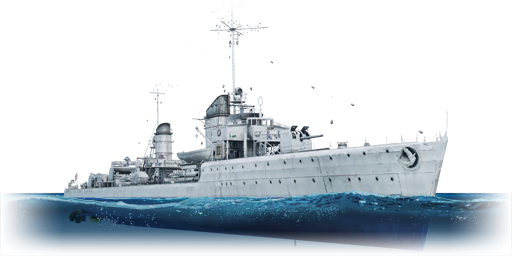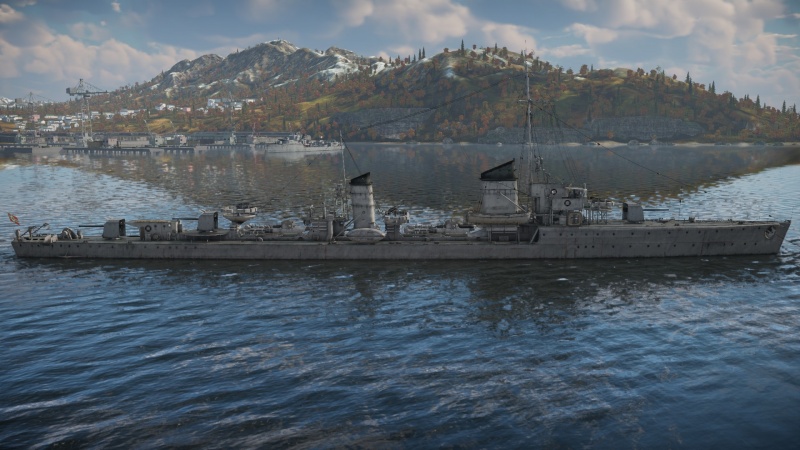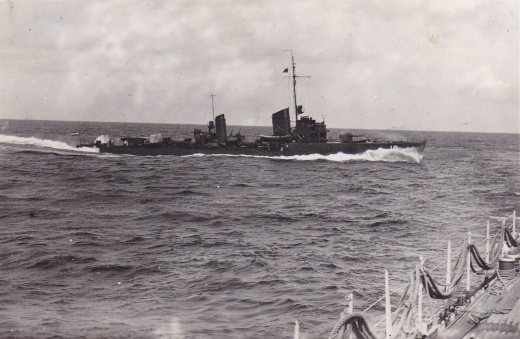Jaguar
Contents
Description
The Raubtier-class, Jaguar, 1941 is a premium gift rank II German destroyer with a battle rating of 3.7 (AB/RB/SB). It was introduced during Update 1.95 "Northern Wind" as a reward for Operation F.R.O.S.T.
General info
Survivability and armour
Talk about the vehicle's armour. Note the most well-defended and most vulnerable zones, e.g. the ammo magazine. Evaluate the composition of components and assemblies responsible for movement and manoeuvrability. Evaluate the survivability of the primary and secondary armaments separately. Don't forget to mention the size of the crew, which plays an important role in fleet mechanics. Save tips on preserving survivability for the "Usage in battles" section. If necessary, use a graphical template to show the most well-protected or most vulnerable points in the armour.
Mobility
Write about the ship's mobility. Evaluate its power and manoeuvrability, rudder rerouting speed, stopping speed at full tilt, with its maximum forward and reverse speed.
| Mobility Characteristics | |||
|---|---|---|---|
| Game Mode | Upgrade Status | Maximum Speed (km/h) | |
| Forward | Reverse | ||
| AB | |||
| Upgraded | 77 | 31 | |
| RB/SB | |||
| Upgraded | 63 | 26 | |
Modifications and economy
Armament
Primary armament
Provide information about the characteristics of the primary armament. Evaluate their efficacy in battle based on their reload speed, ballistics and the capacity of their shells. Add a link to the main article about the weapon: {{main|Weapon name (calibre)}}. Broadly describe the ammunition available for the primary armament, and provide recommendations on how to use it and which ammunition to choose.
Secondary armament
Some ships are fitted with weapons of various calibres. Secondary armaments are defined as weapons chosen with the control Select secondary weapon. Evaluate the secondary armaments and give advice on how to use them. Describe the ammunition available for the secondary armament. Provide recommendations on how to use them and which ammunition to choose. Remember that any anti-air armament, even heavy calibre weapons, belong in the next section. If there is no secondary armament, remove this section.
Additional armament
Describe the available additional armaments of the ship: depth charges, mines, torpedoes. Talk about their positions, available ammunition and launch features such as dead zones of torpedoes. If there is no additional armament, remove this section.
Usage in battles
Describe the technique of using this ship, the characteristics of her use in a team and tips on strategy. Abstain from writing an entire guide – don't try to provide a single point of view, but give the reader food for thought. Talk about the most dangerous opponents for this vehicle and provide recommendations on fighting them. If necessary, note the specifics of playing with this vehicle in various modes (AB, RB, SB).
Pros and cons
Summarise and briefly evaluate the vehicle in terms of its characteristics and combat effectiveness. Mark its pros and cons in the bulleted list. Try not to use more than 6 points for each of the characteristics. Avoid using categorical definitions such as "bad", "good" and the like - use substitutions with softer forms such as "inadequate" and "effective".
Pros:
Cons:
History
The Type 1924 "Jaguar" was a heavy torpedo boat of the six-ship "Type 24" class. Built for the newly-established German Navy in the 1920s, the ships were extremely heavily-armed for a ship of their size. She sailed on several non-intervention patrols for the German Navy during the Spanish civil war, and laid many minefields during the Second World War. By the start of 1942, Jaguar was one of two remaining ships of the class still afloat; she served until the D-Day landings, where she was sunk by allied bombers while in port at Le Havre.
Design and development
The "Type 24" class of 1924 were a class of six heavy torpedo boats built for the German navy. Despite them being extremely heavily armed and close to destroyer-size, they were classified as torpedo boats by the German navy. In War Thunder, these vessels are classified as destroyers. The ships displaced 1300 tons full load and could make a top speed of 34 knots (63 km/h). They had a crew of 129 crew members, which was relatively small for a destroyer but large for a torpedo boat. Jaguar carried three 10.5 cm (4 inch) naval guns, as well as six 533 mm torpedo tubes. Later on, she received four 2 cm Flakvierling anti-aircraft guns for air defence. Jaguar was the last ship of her class to be laid down, in May of 1927 at Wilhelmshaven. Following her completion, she was commissioned in August of 1929.
Operational history
After her commissioning, Jaguar was commissioned into the 3rd Torpedo Boat flotilla along with her sister ships. During the late 1930s, she made several non-intervention patrols in the seas off of Spain due to the Spanish Civil War. At the start of the Second World War, Jaguar made several anti-contraband patrols with her sister ships, then sailed towards Norway to provide support for the German Norwegian campaign. During this time, she escorted the heavily-damaged pocket battleship Lutzow after she was torpedoed, as well as the Scharnhorst. She also participated in extensive mine-laying duties, laying mines in the North Sea and off of Dover (in the United Kingdom).
In February of 1941, Jaguar escorted the battlecruisers Scharnhorst and Gneisenau to the French port of Brest after their North Atlantic raid, and soon after escorted them back out on the Channel Dash. She later the battlecruisers, along with the battleship Tirpitz, on their voyages between various Norwegian fjords and inlets. In June of 1943, Jaguar recommenced her usual role, and laid more mines in the north sea. In early 1944, Jaguar laid more mines in the English Channel; at this point, she was based at the port of Le Havre. However, it was there that she met her final fate. In June of 1944, shortly after the D-Day landings, RAF bombers bombed Le Havre with the goal of destroying all German ships there. Jaguar, along with her sole remaining sister ship Falke, were both sunk by bombs.
Media
Excellent additions to the article would be video guides, screenshots from the game, and photos.
See also
Links to articles on the War Thunder Wiki that you think will be useful for the reader, for example:
- reference to the series of the ship;
- links to approximate analogues of other nations and research trees.
External links
References
- Naval Encyclopedia. (2020, May 22). German ww2 Destroyers. Retrieved January 04, 2021, from https://www.naval-encyclopedia.com/ww2/nazi-germany/german-destroyers-of-ww2
- NAVYPEDIA. (2007). 1924 Type Torpedo Boats. Retrieved January 04, 2021, from http://www.navypedia.org/ships/germany/ger_tb_1924.htm
| Germany destroyers | |
|---|---|
| Torpedo boats | |
| Type 1924 | Jaguar · Leopard · Luchs |
| Type 1939 | T22 · T31 |
| Destoyers | |
| Type 1934A | Z12 Erich Giese · Z15 Erich Steinbrinck |
| Type 1936 | Z20 Karl Galster · Z22 Anton Schmitt |
| Type 1936A | Z25 · Z32 |
| Type 1936B | Z43 |
| Type 1936C | Z46 · Z47 |
| Germany premium ships | |
|---|---|
| Motor torpedo boats | LS 4 Esau · KM-5 · S-204 Lang · S-701 |
| Minelayers | VS-8 |
| Sub-chasers | M-802 |
| Frigates | Lübeck |
| Destroyers | Jaguar · Luchs · T31 · Z20 Karl Galster · Z25 · Z47 |
| Light cruisers | Karlsruhe |
| Heavy cruisers | Prinz Eugen |
| Battleships | SMS Nassau |






